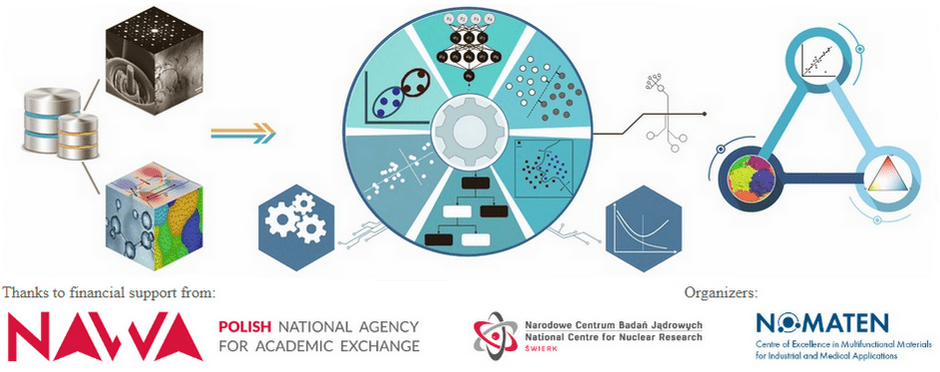Wednesday 01 June 2022 – Friday 03 June 2022
NCBJ HQ in Otwock / Hybrid Mode
Scientific Program (last updated: May 30th, 2022)
June 1st
Welcome Session
– Welcome Address: NCBJ Director prof. Krzysztof Kurek (10:00–10:05)
- Welcome Address: Atomic energy and Materials Science in Poland (Ministry of Climate and Environment) (10:05–10:10)
- NAWA Welcome Address 1 (Mr Piotr Kępski) (10:10–10:20)
– Welcome Address: Christophe Galle (CEA, Partner of NOMATEN CoE) (10:20–10:25)
– NOMATEN Center of Excellence and Research Goals: Mikko Alava (NOMATEN CoE Director) (10:25–10:30)
[coffee break] (10:30–10:45)
- Overview of the Conference Programme (Stefanos Papanikolaou) (10:45–11:00)
Plenary Presentation:
11:00–11:50: Surya Kalidindi, Georgia Tech, USA,
Machine Learning and Materials Informatics Innovation: Current State
[Lunch Buffet] (12:00 – 13:00)
Session 1: Mechanics and defects in crystals: Large data and machine learning (13:00 – 15:15)
Chair: Fabrizio Rovaris (NCBJ)
13:45 – 14:15: Silvia Bonfanti (NCBJ, Poland), Predicting the failure of two-dimensional silica glasses.
[coffee break] [15:15 - 15:30]
Session 2: Interatomic Potentials towards proper capture of mesoscale effects in molecular simulations (15:30 – 18:15)
Chair: Lasse Laurson (Tampere U)
16:15 – 17.00: M. Cosmin Marinica (CEA, France), Machine Learning for Atomistic Materials Science
17:00 – 17.45: Gabriel Stoltz (ENPC, France), Coarse-graining molecular systems with autoencoders and adaptive sampling.
[Poster Session & Buffet] [18:15 - 19:30]
June 2nd
[Breakfast at Hotel -- Buses leave at ~07:45]
Session 3: Large Data Mechanics and Physics of Solids: Applications of materials informatics (09:00–12:15) Chair: Silvia Bonfanti (NCBJ)
10:45 – 11:15: Lasse Laurson (Tampere U, Finland), Inferring Microstructure-Property Relationships in Discrete Dislocation Plasticity: Deformation Predictability and Materials Design.
11:15 – 11:45: Luca Messina (CEA, France), Atomic-scale modeling of chemically disordered compounds by means of generative models.
11:45 – 12:15: Henri Salmenjoki (Aalto U, Finland), Correlation between dislocation avalanches and the impact on the stress-strain curve.
[Lunch Buffet] (12:15 – 12:45)
Session 4. Material discovery, materials by design and Multiscale Materials Modeling (12:45–15:00)
Chair: Javier Dominguez (NCBJ)
12:45 – 13:30: Y. Morris Wang (UCLA, USA), Critical modelling and informatics need for materials in additive manufacturing
13:30 – 14:00: Milica Todorovic (Uturk U, Finland), Computational materials engineering with active learning
14:00 – 14:30: Noel Jakse (Grenoble, France), Crystal nucleation in metallic systems: Unsupervised topological learning approach.
[coffee break] [15:00-15:15]
Session 5. Machine Learning, Ontologies and data operability approaches in a FAIR world (15:15–18:00) Chair: Amin Esfandiarpour (NCBJ)
15:15 – 16:00: Stefan Sandfeld (FZ Jülich, Germany) *online, From Ontologies and FAIR Data to Ma-chine Learning-based High-Throughput Data Mining of In-Situ TEM Experiments on Dislocations in HEAs
16:45 – 17:30: Maciej Mazurowski (Duke U, USA) *online, Deep learning in medical imaging
17:30 – 18:00: Akhtar Zeb (VTT, Finland), Ontological modelling of creep void analysis data to automate machine learning training process.
[Welcome Dinner -- Restauracja Warszawska -- Warsaw Downtown -- 20:15]
June 3rd
Session 6. Industry applications and opportunities of materials informatics methods (09:30–12:15)
Chair: Karol Frydrych (NCBJ)
09:30 – 10.15: Arkadiusz Sitek (Sano Institute, Poland), Sano Centre for Computational Medicine – journey to transform healthcare.
10:15 – 10.45: Pawel Sobkowicz (NCBJ, Poland), Selected legal aspects of AI/ML development and deployment.
11:15 – 11.45: Kamran Karimi (NCBJ), Using machine learning to predict short-range ordering in metallic glasses.
11:45 – 12.15: Marcin Minkowski (TAU, Finland), Strain-rate-dependent predictability of discrete dislocation plasticity.
[Lunch Buffet] (12:15 – 12:45)
Concluding Remarks Round Table (June 3rd) (12:45 – 13:15)

